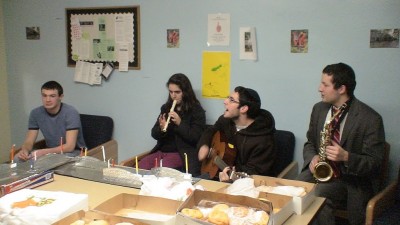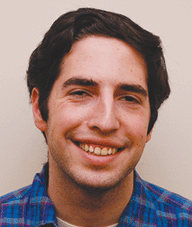
It all started with Chanukkah caroling. Late one night, in the midst of finals week stress, a few male Modern Orthodox University of Pennsylvania students decided to carol some Channukah songs at the doors of their Jewish friends. As they walked down the hallway, snapping their fingers and singing in a loud messy harmony, they noticed that other doors began opening and unfamiliar faces appeared.
“A girl across the hall opens the door and she asks, are you guys singing Chanukah songs?” recalls Hart Levine, one of the students involved. “And my first reaction was: Oh man, she’s going to be angry. But then, instead, she smiled and said I’m Jewish too, can you sing for me?”
And so it began. Two hours later, the caroling crew had sung for most of the dorm. A “frat guy” invited them into his room and showed them the Chanukah cookies that his mom had sent him.

The surprise discovery of the evening was that, despite the two years that all of the carolers had spent devoted to Jewish life on campus, none of them had recognized a single one of the Jewish faces that requested their holiday cheer.
This got Hart Levine thinking about the hundreds of Jewish students on campus that don’t go to Hillel or attend Jewish programming on campus. Where did these students get their Jewish fix? Did they even have one?
“Hillel is great, but only if you already have a core Jewish identity. I began noticing that a lot of the Jews on campus didn’t feel comfortable at Hillel and never came—there are all these people that want to do Jewish things, but somehow aren’t!” says Levine.
Such is the founding tale of Heart to Heart, a grass-roots Shabbat dinner organization dedicated to spreading Judaism to the parts of campus that traditional institutions like Hillel and Chabad don’t usually reach. Since its inception in 2008, Heart to Heart has spread to college campuses across the United States and England. The initiative, which 26 year-old Levine currently runs out of the Orthodox Union offices in New York City, now includes a kosher food directory and has an official Leadership Shabbaton program. It has also extended its reach to help pre-college students make decisions about colleges from a Jewish perspective, providing support for religious Jews living on campuses with no religious structure, and aiding the communities of post-college/Birthright Jews.
“I think it is totally absurd that Shabbat meals are going to a cafeteria and sitting with your friends and getting your tray… the Orthodox sit together, the Conservative sit together… In order to break people out of that shell, you have to create a separate environment,” says Levine.
Levine grew up in a Modern Orthodox environment in Manhattan, attended Ramaz Jewish Day School then took a gap year to study Torah in Israel before starting at the University of Pennsylvania.

He speaks of his freshman year at Penn as “an extension” of his previous life. “We would sing the same songs and give the same divrei Torah—it re-created what I had known previously.” He lived with two friends from yeshiva and a friend from Ramaz, and went to Hillel every weekend for services and dinner. He was aware of the other 1,000 Jewish students living around him, he says, but not too concerned.
The idea for hosting “welcoming” Shabbat dinners came a few months after the night of Channukah caroling, after a few trial runs of other activities, such as knocking on people’s doors on Friday night with a wine bottle and a smile, had failed.
“What was bad about the wine-bottle plan was that it was impersonal, it was random, and we didn’t get to talk to them or know them. So we thought, what if we do something where we invited people over and get to know them. Like a Shabbat dinner?” recalls Levine.
And so the preparation began: kugel was cooked, a suitcase of food was filled, and the third floor lounge was reserved. The group of five “affiliated” invited 10 “unaffiliated” friends and hallmates to the meal. There were 16 in total.
“It was amazing. For three or four hours we sat and talked and sang songs. And I was like, who are these people? How many more of them are there?” said Levine.
He thought about it more over the summer, and decided that these Shabbat meals were something he was serious about continuing. His junior year saw ten meals. His senior year, 35.
“At first I was nervous, because we were doing things on our own. I got an email from the Hillel director saying he wanted to meet with me. When I got there, he was like ‘What are you doing?’ and then he said, ‘Okay this is amazing, this is what we need. Our Hillel is full. We need other spaces for the other 2,000 people on campus.”
A bioengineering major, Levine graduated college and made a bold move: to forsake his future path in the sciences for the unstable and financially unreliable world of Jewish non-profits. He justified it to his parents through the Teach For America model, explaining that he would view his Heart to Heart organization as two years of community service, and if it didn’t work, he would then go back to bioengineering. He emailed the Hillel headquarters, and convinced them that he his ideas were “five years ahead” of theirs, and he was offered a summer internship at their D.C. headquarters. He was in touch with the Orthodox Union, and decided to move back to New York after the summer and work through their office, due to more reliable funding opportunities.
Those early post-grad years saw Levine couch-surfing every weekend, as he attempted to spread the seeds of his Shabbat dinner outreach model.

As he began working at the O.U., he enrolled Yeshiva University’s Rabbi Isaac Elchanan Theological Seminary where he studies for rabbinic ordination. The early days of his post-grad life were exhausting: learning from 9 A.M. to 2 P.M., and then working on Heart to Heart from 2 P.M. to 2 A.M. “And I’d be traveling every week to a different college. Start emailing people on Wednesday, go there and spend Shabbat, start talking to people, and then follow up with them, then Wednesday comes, and I start it all over again,” says Levine.
In the hopes of letting each campus’ community to develop its own, personal manifestation of his program, Levine has been taking a less hands-on approach in recent months. He keeps in touch with a coordinator on each campus, but doesn’t run Shabbat meals anymore. He doesn’t know quite where Heart to Heart will go in the future, and how much longer he should continue in his current role, but he sees much possibility in the ethos of Heart to Heart: creating meaningful and welcoming Jewish communities, and helping more Jews find their places in those communities.
“There is a real need in shifting the paradigm that only rabbis or Chabad are the messengers or spaces of Judaism. Your dorm and your friends can be spaces for Judaism,” says Levine.
He is currently finishing up his rabbinical degree, drafting his Heart to Heart stories into a possible book, and contemplating moving to a small, stable campus community to concentrate his energy and passion.
His advice for others that are about to graduate?
“Two important values are confidence and humility, and balancing the two. Have the confidence to run ahead and know you’ll succeed and that the world needs what you’re working on, and the humility that you idea might no be the best idea ever, or it will die in a year, or you might not have the connections or funding. Don’t let that stop you, but be mindful. A lot of it is about the balance between forging my own path, and being realistic about finding ways to connect with the world and the existing framework.”
Hannah B. Rubin is a student a Wesleyan University.

